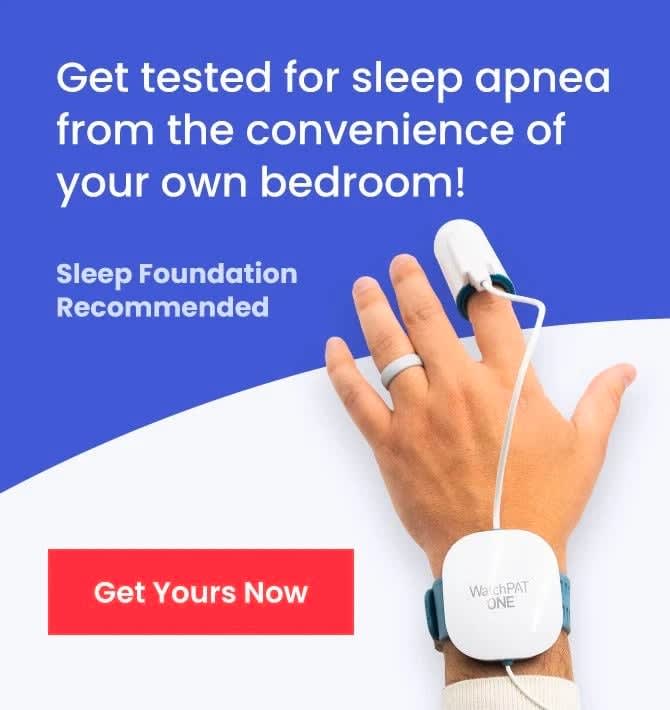When you buy through our links, we may earn a commission. Products or services may be offered by an affiliated entity. Learn more.
Best CPAP Masks for Mouth Breathers
Top Picks to Prevent Leaks
Medical Disclaimer: The content on this page should not be taken as medical advice or used as a recommendation for any specific treatment or medication. Always consult your doctor before taking a new medication or changing your current treatment.
Continuous positive airway pressure (CPAP) therapy helps reduce symptoms of sleep apnea by delivering pressurized air through a mask to keep the upper airway open during sleep. While CPAP treatment is very effective, you may have unique considerations to take into account if you breathe through your mouth while sleeping.
While a nasal CPAP mask, which delivers air to just the nose, is often the first type of mask recommended by doctors, some people cannot use this mask style successfully due to mouth leak. For this reason, people who persistently breathe through their mouth may be prescribed a full-face mask that covers both the nose and mouth.
We’ll delve deeper into how to choose a CPAP mask for mouth breathing and share our top recommendations.
What’s the Best CPAP Mask for Mouth Breathers?
The Philips Respironics DreamWear Full Face CPAP Mask has a sleek design with a smaller footprint than the average full-face model. Minimalist nasal cushions seal just under the nose, while the headgear leaves a wide berth around the eyes, providing a clear line of sight for reading or watching television in bed.
The Best CPAP Masks for Mouth Breathers
-
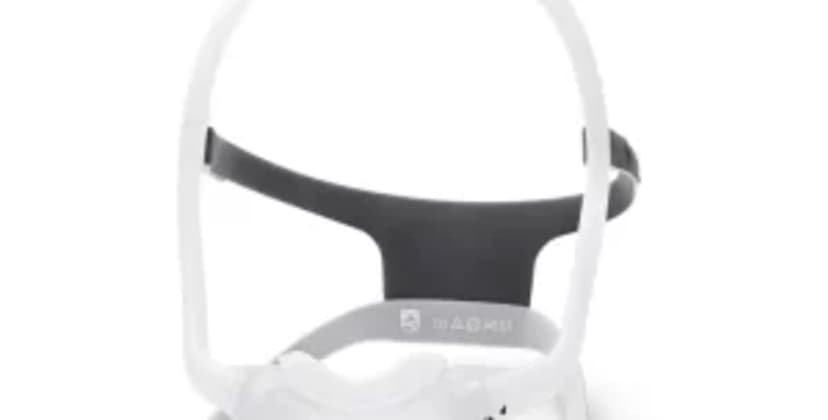
Best Overall
Philips Respironics DreamWear Full Face CPAP Mask
Shop Now
-
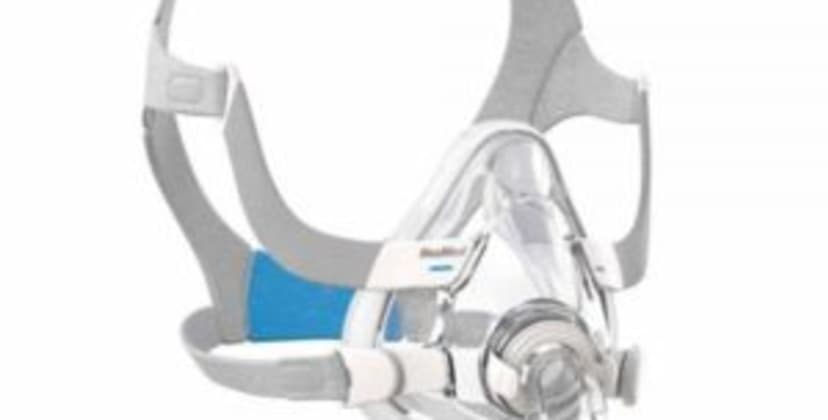
Best for Side Sleepers
ResMed AirFit F20 Full Face CPAP Mask
Shop Now
-
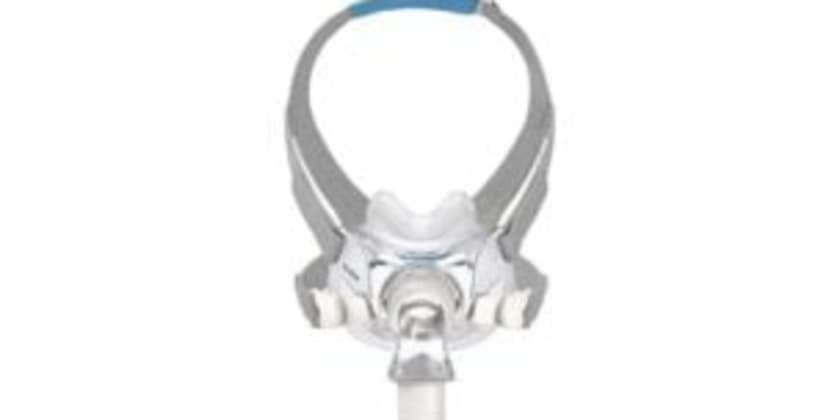
Best for People Who Wear Glasses
ResMed AirFit F30 Full Face CPAP Mask
Shop Now
-
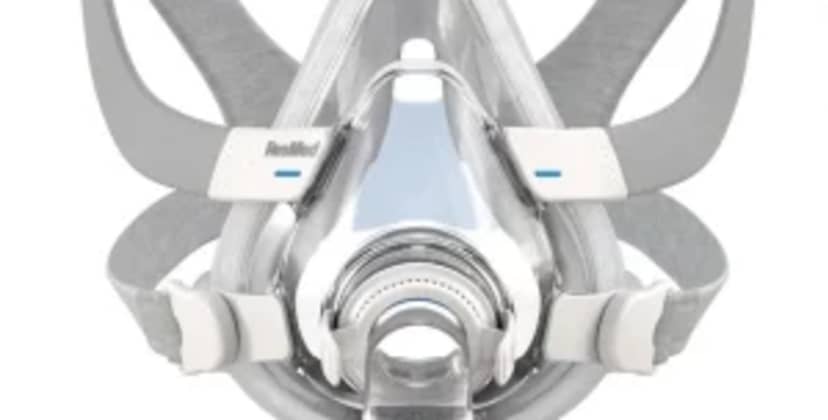
Most Comfortable
ResMed AirTouch F20 Full Face CPAP Mask with Headgear
Shop Now
In-Depth Reviews
Best Overall
Philips Respironics DreamWear Full Face CPAP Mask
Use this link for the most current Philips Respironics discount
Shop Now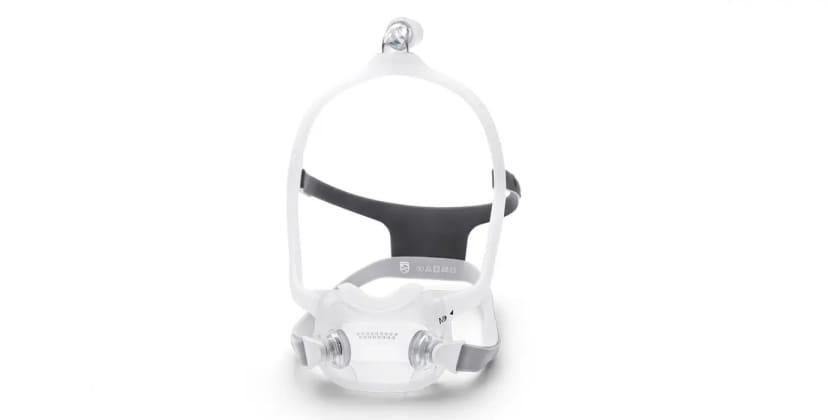
-
Pros
-
Top-of-head tubing attachment allows flexibility to sleep on your stomach, side, or back
-
Airflow automatically compensates to stay the same when side sleeping
-
Frame is compatible with full-face, nasal, and nasal pillow setups
-
-
Cons
-
Airflow through the hollow frame makes some noise as it passes next to the ears
-
Contains magnets that may interfere with implanted medical devices
-
Price
$135
The Philips Respironics DreamWear Full Face Mask comes with a wider range of cushions and settings than the typical mask. Users can alternate between a full-face mask, a nasal gel cushion, and a nasal pillow. Four headgear settings prevent an overly loose or tight fit.
Unlike standard full-face designs, the cushion of the DreamWear Full Face Mask sits below the nose, helping to prevent painful indentations and pressure points. The frame is made from soft, lightweight silicone that gently contours the face. The tube connects at the top of the head, so visibility isn’t obstructed. Flexible tubing ensures a secure seal even for restless sleepers.
The mask is easy to take on and off, thanks to the Velcro straps on the headgear and the magnetic clips that fasten the cushion. Full-face cushions come in small, medium, medium wide, and large sizes. If you’re between sizes, Philips recommends going with the smaller of the two.
To maintain a hygienic mask, hand-wash the frame and cushion with warm, soapy water after each use. The headgear only needs to be washed by hand weekly. A 90-day limited warranty protects customers from manufacturing and material defects.
Best for Side Sleepers
ResMed AirFit F20 Full Face CPAP Mask
Use this link for the most current ResMed discount
Shop Now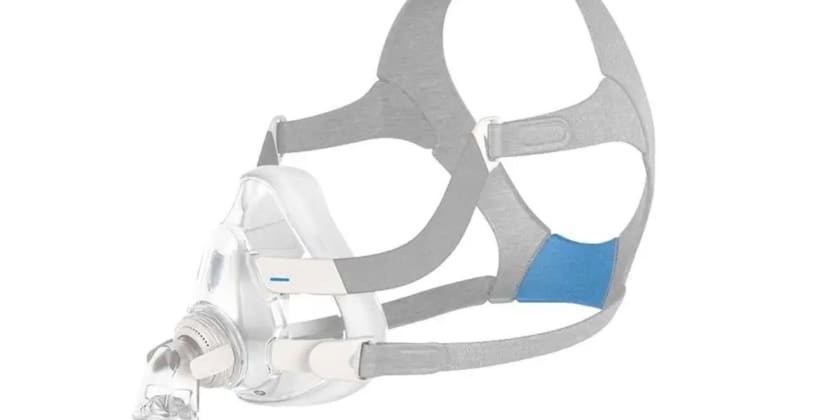
-
Pros
-
Choice of five cushion sizes lets side sleepers find their ideal fit
-
Proprietary cushion design forms a seal without overtightening
-
Diffused air venting system reduces noise
-
-
Cons
-
Mask covers the bridge of the nose and may cause irritation
-
Magnetic straps may be a problem for people with implanted medical devices
-
Price
$155
Full face masks tend to cost more than other CPAP masks types, but some models manage to be affordable without sacrificing quality or performance. The ResMed AirFit F20 falls squarely in this category. With a flexible frame, gente cushion for the bridge of your nose, and contoured chin to ensure a consistent seal throughout the night, the AirFit F20 is one of the most comfortable — and most reliable — full face masks on the market today.
You can choose from small, medium, and large cushions based on your facial profile. The mask is also available in “for him” and “for her” designs, the latter of which is slightly more slender. The flexible frame is compatible with all cushion sizes. Magnetic clips enable easy release when you need to take off the mask, while integrated padding helps prevent harsh rubbing and irritation on the skin. As a full face mask, you can use it with any pressure settings — even high levels that can be too intense for nasal or nasal pillow masks.
Since the forehead is open, you won’t have to worry about limited line of sight while wearing the mask. This design also allows you to read or watch television in bed, and the straps are thin enough to comfortably sleep on your side. Prices vary by size and seller. If you order the ResMed AirFit F20 through The Sleep Doctor, you’ll receive a 5% discount when you sign up for a subscription, rather than making a one-time purchase.
Disclaimer: In November 2023, ResMed issued a safety notice cautioning that the magnetic clips on this model and other ResMed masks should be kept at least 6 inches away from any implanted medical device that may be affected by magnets, including pacemakers and insulin pumps. The company also warns that other metallic implants such as valves, stents, and certain dental implants may be impacted by the magnetic clips.
Best for People Who Wear Glasses
ResMed AirFit F30 Full Face CPAP Mask
Use this link for the most current ResMed discount
Shop Now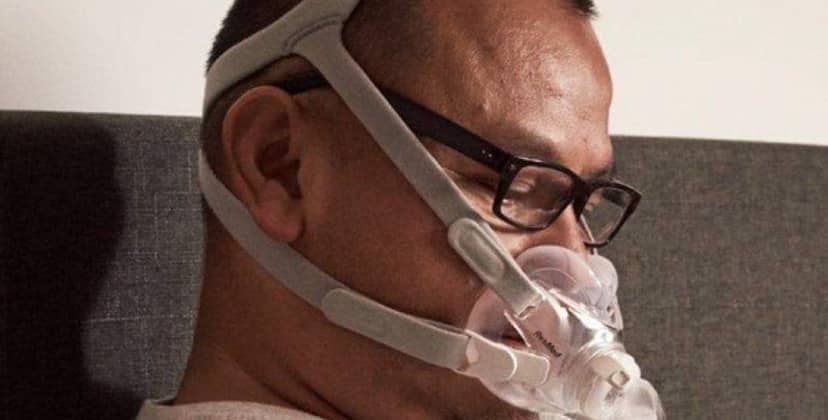
-
Pros
-
Low-profile cushion leaves the bridge of the nose free
-
Mask allows a wide field of vision and accommodates eyeglasses
-
Quick-release elbow allows users to disconnect tubing without removing the mask
-
-
Cons
-
Contains magnets and may not be safe for people with implanted devices
-
Headgear straps may become tangled in long hair
-
Price
$170
Most people who primarily breathe through their mouths need a CPAP mask that forms a tight seal and provides steady airflow, but these masks tend to be somewhat bulky and uncomfortable. The ResMed AirFit F30 is the best of both worlds: a full face mask that delivers continuous air with an adjustable, low-profile design that isn’t too heavy. The soft mesh straps conform to your face, and magnetic clips help you easily customize the fit.
Since the cushion rests beneath the bridge of your nose, irritation and red marks shouldn’t be an issue. This also allows you to wear glasses without the lenses fogging up. Without a forehead strap, you should have complete visibility while wearing the mask if you enjoy watching television or reading in bed. The hose is located directly in front of the mouth, ensuring sufficient airflow throughout the night.
You can swivel the hose in any direction, so you can comfortably sleep on your back or side, and the quick-release lets you quickly attach and detach the connective tube. The headgear has a one-size-fits-all design, but you can choose between small and medium size cushions. ResMed offers a printable chart to help you determine the proper size, and recommends choosing the medium cushions if you fall between the sizes.
The AirFit F30 carries a mid-range price-point. Those who order from The Sleep Doctor receive a 5% discount on their purchase when they sign up for a subscription. Shipping is free of charge for all orders in the contiguous U.S., and you may return the mask within 30 days as long as it hasn’t been used.
Disclaimer: In November 2023, ResMed issued a safety notice cautioning that the magnetic clips on this model and other ResMed masks should be kept at least 6 inches away from any implanted medical device that may be affected by magnets, including pacemakers and insulin pumps. The company also warns that other metallic implants such as valves, stents, and certain dental implants may be impacted by the magnetic clips.
Most Comfortable
ResMed AirTouch F20 Full Face CPAP Mask with Headgear
Use this link for the most current ResMed discount
Shop Now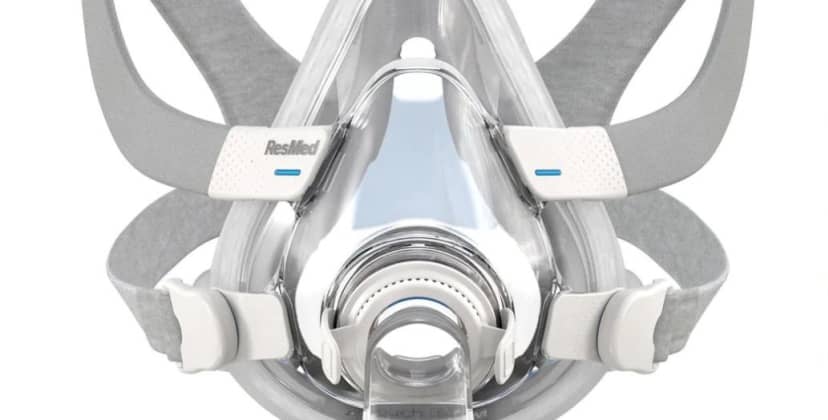
-
Pros
-
Memory foam cushions are gentle on skin
-
Air vents quietly disperse air
-
Comes in five cushion sizes
-
-
Cons
-
Magnets may interfere with implanted medical devices
-
Memory foam may be difficult to keep clean
-
Price
$154
The ResMed AirTouch F20 Full Face CPAP Mask is a low-profile alternative to bulky full-face masks. Geared toward mouth breathers, the mask is designed to keep a secure seal over the nose and mouth. The foam cushions are exceptionally soft, setting this model apart from other masks on the market.
The mask is available in three different sizes, so most sleepers should be able to find a mask that suits the size and profile of their head. ResMed also offers a “for her” model, which has smaller headgear and features hints of lavender coloring. What stands out most with the AirTouch F20 is the memory foam pads, which are softer than the silicone cushions you’ll find on many masks. The foam contours closely to your face to enhance comfort and form a tighter seal. The cushions are interchangeable with ResMed’s AirFit masks, if you’d like the comfort of foam cushions on an AirFit frame.
The headgear features magnetic clips for quick and easy removal. Note that the foam cushions may only be cleaned on the surface and should not be submerged in water. ResMed recommends replacing the cushions every month.
The ResMed AirTouch F20 qualifies for free shipping to U.S. addresses.
Disclaimer: In November 2023, ResMed issued a safety notice cautioning that the magnetic clips on this model and other ResMed masks should be kept at least 6 inches away from any implanted medical device that may be affected by magnets, including pacemakers and insulin pumps. The company also warns that other metallic implants such as valves, stents, and certain dental implants may be impacted by the magnetic clips.
Which CPAP Masks Are Best for Mouth Breathing?
Doctors sometimes recommend nasal masks as a first-line treatment even for people who breathe through their mouth while asleep, since some CPAP users switch to nasal breathing during therapy. However, a nasal mask may not work for people who continue to breathe through their mouth during treatment or those with nasal congestion.
If your mouth persistently falls open during CPAP therapy, experts usually recommend using either a full-face mask, which delivers air to both the nose and mouth, or a nasal mask with a chin strap to keep the mouth closed. Other options include a hybrid mask, a total face mask, or an oral mask, all of which blow air into the mouth.
| Mask Type | Description |
|---|---|
| Full-Face CPAP Mask | A full-face CPAP mask forms a seal extending from the bridge of the nose down to just below the mouth, delivering air to both. Full-face masks may be more comfortable at higher pressure settings than masks that deliver direct airflow to the nostrils. |
| Hybrid CPAP Mask | Hybrid CPAP masks are similar to full-face masks in that they direct pressurized air to the nose and mouth. However, instead of covering the entire nose, hybrid masks may use nasal pillow inserts or a nasal cradle design that seals just below the nostrils. |
| Total Face CPAP Mask | Total face CPAP masks cover the entire face, including the eyes. While these masks are less common, some people may find they feel more comfortable as they form one single seal around the perimeter of the face. |
| Oral CPAP Mask | Oral CPAP masks cover just the mouth. This mask design is rarely seen, because airflow to the nose is considered an integral part of CPAP therapy. However, oral masks may be appropriate if your nose is severely congested or if you have a condition that makes it uncomfortable to receive airflow through the nose. |
Which CPAP Masks Should Mouth Breathers Avoid?
Experts generally recommend avoiding nasal masks and nasal pillow masks if you are unable to breathe through your nose, such as if you have a deviated septum or chronic nasal congestion. However, if your nose is unobstructed, your doctor may recommend using a nasal mask with a chin strap to keep your mouth closed.
What to Consider in a CPAP Mask for Mouth Breathing
A CPAP mask is medical equipment, so it’s important to follow your doctor’s recommendations and look for a model that suits your therapy needs. It’s also something you’ll wear every night, so you should prioritize factors like comfort, fit, and design.
Fit and Size
Your mask should form a comfortable seal without being too tight. Manufacturers provide sizing guides to help you choose the mask that best fits your face. Experts encourage trying several different models and experimenting with adjusting the headgear and cushions to find a good fit.
Comfort
If you’re comfortable in your CPAP mask, you’re more likely to wear it every night, and regular use is a key component of CPAP therapy success. By definition, a full-face mask covers more of the face than a nasal-only mask. However, many manufacturers offer streamlined models made with soft materials.
Headgear
Headgear for full-face masks tends to offer more coverage than headgear for nasal masks. Options range from masks with a stability bar across the forehead to low-profile designs that keep the straps on the side and afford a wider field of vision.
Sleeping Position
If you sleep on your back, you should find it easier to choose a CPAP mask, as this sleeping position works well with top-of-head as well as front-of-face tubing attachments. By contrast, side and stomach sleepers may find that the mask catches on the pillow or bedding, leading to air leaks. For these sleepers, a top-of-head tubing attachment is generally best.
Machine Compatibility
While most masks are designed to work with almost all CPAP machines, certain manufacturers may require that you use their equipment for both. The user guide or manufacturer website should provide information on compatibility with CPAP machines, tubing, humidifiers, and other accessories. A hose adapter can help link your mask to tubing with a different diameter.
Recalls and Warranties
Most CPAP masks come with a short warranty that covers manufacturing defects. The warranty period may differ for the different mask parts.
In the event that manufacturers detect a problem with the mask design, especially if it poses a safety issue, they may issue a recall asking you to return the mask and receive a different one in exchange. You can usually find recall information on the manufacturer’s website, or talk to your doctor.
Where Can You Buy a CPAP Mask for Mouth Breathing?
CPAP masks are sold through durable medical equipment providers, both online and at physical locations. You may also be able to obtain a CPAP mask through your health care team. Buying online often offers better prices and a larger selection, but you may prefer to buy from a store or a sleep specialist if you would like help choosing a model.
Pricing, Prescriptions, and Insurance Coverage
Full-face CPAP masks range in price from approximately $60 to $200, with nasal masks priced slightly lower on average. The brand, materials, and design can all influence the cost.
Medicare, Medicaid, and many private insurance plans will help cover the cost of CPAP therapy as long as you meet certain requirements to prove you use your machine regularly. Masks are considered a Class II medical device and require a prescription for purchase, although replacement parts can be purchased without a prescription.
Dive Deeper: In-Depth CPAP Guides
Besides a mask, essential CPAP components include a machine and tubing. If you still need a device to pair with your mask, check out our team’s picks for the best CPAP machines. We’ve also put together picks lists for a variety of the best CPAP accessories, found below.
Data-Driven Results You Can Trust
We carefully curated our list of the best CPAP masks for mouth breathers by combing through dozens of competing models and comparing their designs, quality of materials, and brand reliability. All of our recommendations are backed by evidence-based knowledge of sleep apnea treatment, with a special emphasis on the therapy needs of people who breathe through their mouth.
Frequently Asked Questions
Many people prone to mouth breathing can successfully wear a CPAP mask. However, you may need to put additional consideration into choosing your mask. If you’re able to breathe through your nose, you can wear a chin strap to keep your mouth shut while sleeping with a nasal mask. If your nose is blocked, you may prefer a full-face mask that delivers air to the mouth as well.
The two best CPAP mask options if you breathe through your mouth while sleeping are a full-face mask or a nasal mask with a chin strap. Both of these options are designed to prevent unwanted mouth leaks during therapy. Your doctor may also recommend a hybrid, total face, or oral mask depending on your situation.
Nasal CPAP masks are not ideal when breathing through your mouth, as the pressurized air can escape, compromising therapy effectiveness. However, there’s some debate about whether full-face masks work as well as nasal masks. Depending on your doctor’s advice, you may want to consider wearing a nasal mask with a chin strap to keep your mouth closed.
The two most common causes of unwanted air leaks are mouth breathing with a nasal mask or wearing a mask that doesn’t fit properly. You can cut down on leaks by choosing a mask in your size that forms a snug seal and wearing a full-face mask or a nasal mask with a chin strap if you often breathe through your mouth. Preventing leaks is important because leaks can cause a drop in pressure and reduce the effectiveness of CPAP therapy.
Full-face CPAP masks usually have four parts: the frame, the cushions, the headgear, and the tubing attachment, each of which can be taken apart and cleaned separately. You should wipe down the cushions every morning. Many people find specialty CPAP wipes convenient for this purpose.
The headgear, mask frame, and tubing attachment need cleaning once a week using warm water and mild detergent. Be sure to rinse and dry each part fully before reassembling the mask. Note that memory foam cushions shouldn’t be submerged in water and just require daily wipedowns. Consult the mask’s user manual for specific cleaning recommendations and replacement schedules.

Still have questions?
Our product experts have extensive experience testing just about every sleep product on the market.
Send an email to [email protected] with your questions and we’ll help you find exactly what you’re looking for.


